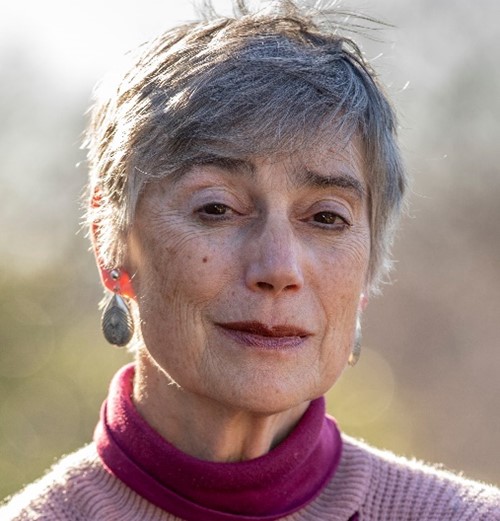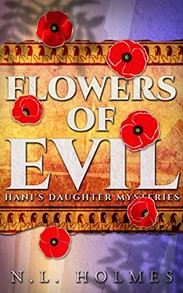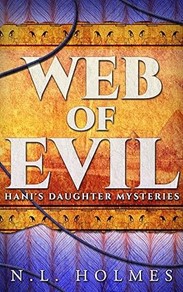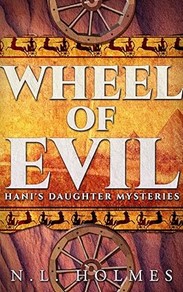
# Please introduce yourself and your book(s)!
I write under the name of N.L. Holmes (my maiden name, in fact, and not a tip of the hat to, the great detective). I’m an archaeologist by profession, although I’ve also been an antiques dealer, a cloistered nun, an interior decorator, and an executive assistant at a foundation. I’m the author of fourteen historical novels, mostly mysteries set in the deep past, and also of poetry. The mother of one grown son, I live with my husband, cats and barnyard fowls in northern France, where I garden, dance, play the violin, and weave. And read, of course!
# What is/are the real-life story(ies) behind your book(s)?
All of my books are based on historical events, and the characters are often real people, although we know nothing about them, so I’ve turned them into personages who are essentially fictional. Some are set in various parts of the Hittite Empire (modern-day Turkey and Syria), but most take place in ancient Egypt at the time of Akhenaten and Tutankhamun. In particular, the Lord Hani series deals with the foreign intrigues of Egypt’s empire and the impact of the upheavals wrought by Akhenaten, the Heretic Pharaoh, on the social fabric of the kingdom. How would these changes, so pretty on paper, have impacted real peoples’ lives? That’s what I’ve tried to explore.
# What inspires/inspired your creativity?
The past! Primarily the events of history, of course, since these are all historical novels, but also my own past. The ups and downs of a modern person’s emotional life is no different from that of a person in long-gone ages, no matter how different everything else may be. So I try to work my own strong moments of feeling into my characters’ adventures. Likewise, my observations of nature, and since I’m an artist from way back, that colors (no pun intended) the way one sees things.
# How do you deal with creative block?
The only truly horrible writer’s block I ever experienced was with my first novel, and I’m convinced that was because I was trying to write the way the books tell you to: outline, make notes, plan everything out. I thought I’d go crazy! As soon as I let go of control and just started writing, I could see the plot unfolding for me. Another trick, if you hit a wall with one scene, is to jump around and write various scenes of conflict or confrontation — the fun stuff — out of order, then stitch them together afterwards. Just keep moving somehow.
# What are the biggest mistakes you can make in a book?
There are lots of them. One, of course, is to assume you don’t need a professional editor. Another would be to underestimate the smarts of your readers. They can follow along, see connections, detect themes plenty well. You don’t have to beat them over the head, either explaining too much or repeating endlessly. Sounds easy, but it happens a lot.
# Do you have tips on choosing titles and covers?
Both titles and cover art go through fads, but generally I’d say pick a title that tells something about your story but gives nothing away. It should be alluring — you want to make people curious. For my Lord Hani series, I’ve used quotes from ancient Egyptian literature, lines that were featured in some way in the text and that represent some aspect of the action. Since they were all chosen by the same criteria, that provides a through-line for the series. Please don’t give them as a subtitle “A Novel”!! Cover art is very personal. My own taste excludes photos of modern women in costumes, especially with their heads cut off! But I’m clearly in the minority. They tell me images of people sell. Be sure to keep the typeface large. People should be able to read the title from afar.



# How do bad reviews and negative feedback affect you and how do you deal with them?
At first, they were an ouch, because when you have few reviews, each one can change the total rating drastically. But after a while, I hardly looked at them anymore, except to express my thanks to the reviewer for bothering by marking “Like.” If everybody seems to be making the same comment, then you need to start thinking about it, though. Is the book slow or improbable? Are the characters unsympathetic? Readers will let you know.
# How has your creation process improved over time?
I’ve become much faster over time because I have my world established, the characters fleshed out, and most of the basic research has been done. Having paid attention to editors over the years, I’m conscious of certain pitfalls and can avoid them up front. It’s like any skill — you become more expert with repetition. Of course, that could cost you in freshness or surprise. I’m sometimes afraid I’m writing the same book over and over!
# What were the best, worst and most surprising things you encountered during the entire process of completing your book(s)?
One peculiar unpleasant thing I encountered took place in writing a book that was first published through Amazon’s Vella format — as a serial. Every week, a 1500-word chunk of the story had to go up online. It would have been all right if I had had time to write the whole book at once then post the episodes at leisure. But I was writing just a jump head of publication! There was no going back to smooth things out, tweak the plot, bury clues, etc. That was one time I wished I had been a systematic “plotter” rather than a “pantser.” I felt a strong solidarity with my 19th-century colleagues like Dickens who wrote so many works of art in serial form.
# Do you tend towards personal satisfaction or aim to serve your readers? Do you balance the two and how?
I guess it’s a balance. I wouldn’t be writing novels set in the Bronze Age if there weren’t a certain amount of stubborn self-indulgence in me! On the other hand, although I wanted to keep writing Hittite stories set in Syria and Turkey, I did realize there was very small group of fans for that world, so I shifted over to Egypt, which is broadly popular — although not as popular as the 20th century or Tudor England, for example. (Americans don’t seem to be able to handle foreign names.) My goal as a novelist is the same as my goal as a teacher: to help people see that the people of the past were just like us. Therefore their decisions aren’t incomprehensible.
# What role do emotions play in creativity?
In my style of writing, everything. I use a close third-person point of view in my books — inside the character’s head. That’s exactly where we intersect with people of the past. To try to imagine how they would react to wars, sacked cities, betrayals, family trials, a writer has to look inside herself, draw on her own emotions, as I said before. The triggering event may be completely different, but we only have so many emotional reactions in our arsenal.
# Do you have any creativity tricks?
I wish! Inspiration and perspiration!
# What are your plans for future books?
I’m currently writing more cozy mysteries of the Hani’s Daughter series, but I also want to do a prequel to the Hani books themselves. There’s one further historical adventure the real Hani was involved in that I haven’t used yet. Also, I want to do a final book in the HIttite Empire at Twilight series that shows the collapse of the empire under its last king. Worlds collapsing interest me from the human point of view.
# Tell us some quirky facts about yourself
I learned to spin when I was writing about spinning, learned to play the violin when I was writing about musicians, and took sulky driving when I did a book about charioteers. I guess that’s a kind of “Method” writing.